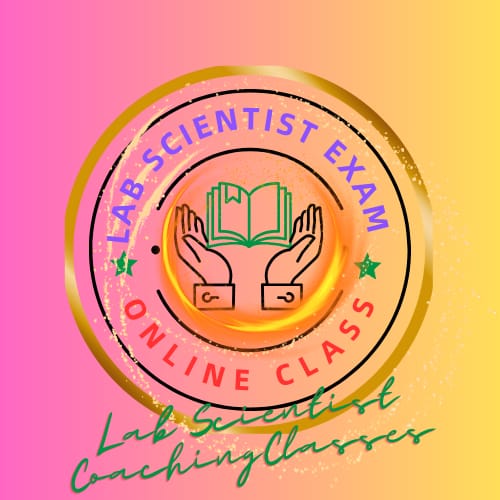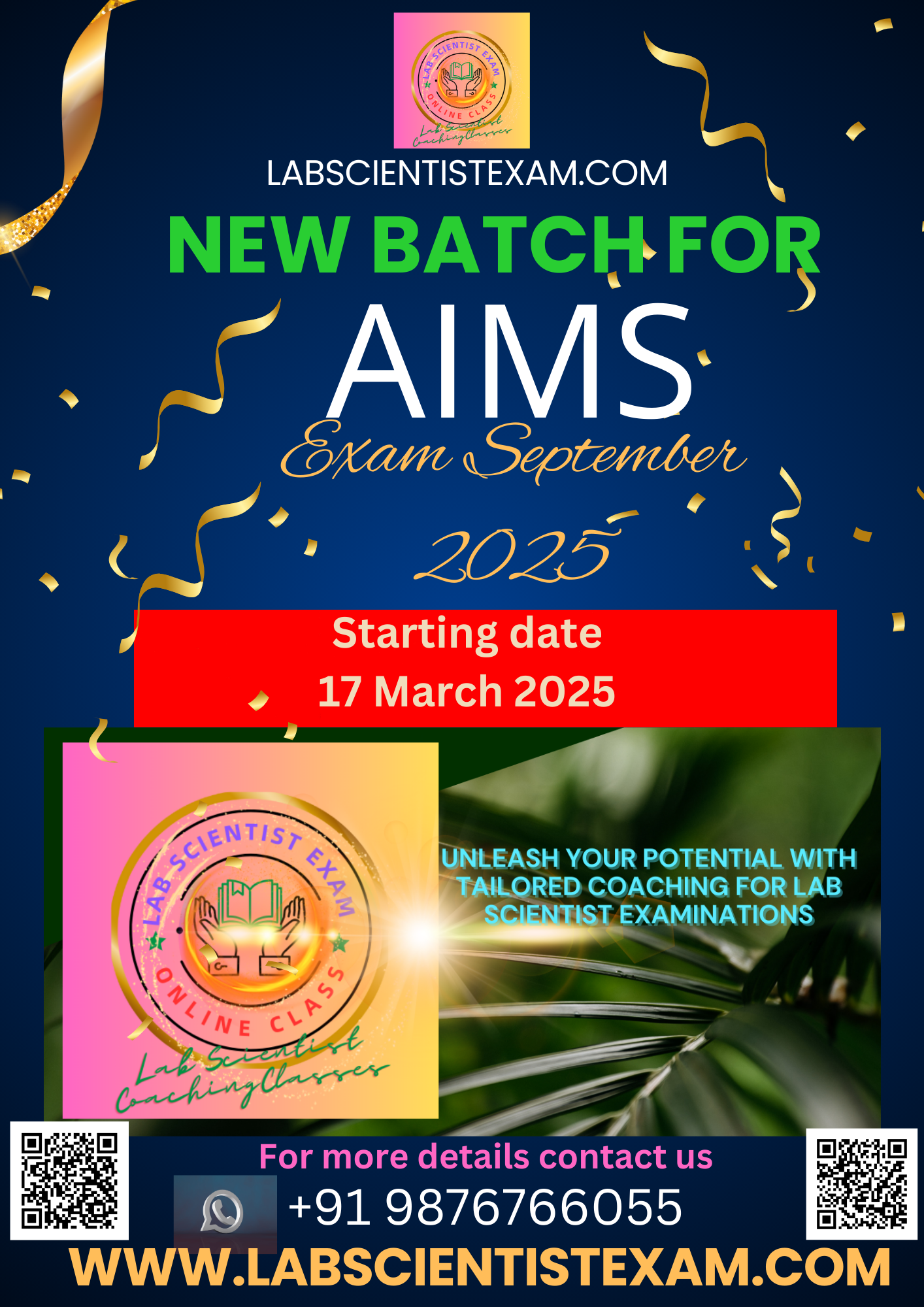We are excited to introduce our comprehensive new course: Recorded Video Lectures—the ultimate preparation solution for aspiring AIMS Exam.This all-inclusive course provides unmatched flexibility, rigorous practice, and expert guidance to help you succeed. What’s Included in the Course? ???? Recorded Video Lectures: Access high-quality, pre-recorded lectures covering all essential topics in Hematology, Histology, Immunology, Medical Microbiology, Transfusion science, Chemical pathology (Clinical Biochemistry), and Quality control & Quality assurance. Learn at your convenience—anytime, anywhere! ???? MCQs for Practice: Strengthen your concepts with a vast collection of carefully curated multiple-choice questions (MCQs) to align with the latest exam patterns. ???? 10 Mock Tests: Prepare like a pro with 10 full-length mock tests, designed to simulate the real exam environment. Build confidence and improve time management skills with detailed feedback after every test. ???? Live Support: Stay connected with our expert faculty through live doubt-clearing sessions and personalized support. Why Choose This Course? Flexible Learning: Study at your own pace with recorded lectures available 24/7. Exam-Focused Preparation: This course is tailored specifically for AIMS exams. Comprehensive Resources: Gain access to in-depth video lectures, practice MCQs, and realistic mock tests. Expert Guidance: Learn from a seasoned educator with a proven track record of helping students achieve top results. Take the next step toward your success with "Recorded Video Lectures"! Visit www.labscientistexam.com today to enroll and start your journey to a rewarding career in lab sciences. Your success is our mission—Enroll now and excel!

WE ENHANCE YOUR TALENT
Our Syllabus

Subject : Principles of Quality Assurance and Quality Control
• The role of internal quality control and external quality assurance
Subject : Genomic Pathology
Basic understanding of inheritance
• Structure of DNA and all forms of RNA
• Mitochondrial DNA
• Transcription and translation
• Influence of epigenetics on phenotypes
• Chromosome structure and common pathologies associated with chromosomal abnormalities
• Common mutations in oncology
inborn errors of metabolism
• Principles of basic thermal and isothermal PCR techniques including sample preparation and use of controls
• Principles of reverse transcriptase PCR real-time PCR and multiplex PCR
• Sample integrity for DNA and RNA based techniques
• Awareness of next generation sequencing (NGS) techniques.
Subject : Immunopathology
• Basic understanding of the structure and function of the immune system
• Adaptive and acquired immune mechanisms
• Cellular and humoral immune responses
• Immunoglobulin properties and functions
• Key cytokines i.e.
IL-1 IL-2 IL-4 IL-6 IL-17 TNF and their functions
• Monoclonal antibodies their production properties and uses
• Mechanisms of hypersensitivity and their laboratory investigation
• Acquired and inherited immune deficiency conditions major autoimmune conditions and their laboratory investigation
• Principles of immunology-based assays e.g immunophenotyping using flow cytometry immunochromatographic techniques solid-phase immune assays immunohistochemical techniques.
Subject : Medical Microbiology
• A basic knowledge of infectious diseases and organisms most commonly associated with these diseases. There will be a greater emphasis on bacterial diseases but some knowledge of parasitic fungal and viral disease is also expected
• Collection handling and processing of samples including the minimum criteria for acceptance of samples
• Knowledge of normal flora (indigenous flora) of major body sites or absence of normal flora in sterile body sites
• Presumptive identification of major groups of bacteria based on microscopic and colonial morphology on a variety of common media including chromogenic media and the use of key basic identification tests such as catalase oxidase and atmospheric growth re
• Principles of major methods of susceptibility testing disc diffusion agar dilution and broth dilution and the relationship between breakpoints MIC and susceptible / resistant categories • Microscopy: Function and maintenance of a modern binocular micro
• Staining techniques: Gram stain Ziehl Neelsen stain Modified ZN stains
• General principles of quality control and quality assurance as it applies to microbiology • Safety in the microbiology laboratory Biosafety Cabinets Biosafety levels.
Subject : Transfusion Science
• Antibody structure and function
• Antigen / antibody interaction
• Antibody production
• Blood donation testing
• Blood components
• Blood group systems
• Antibody detection and identification
• Pre transfusion testing
• Haemolytic disease of the foetus and newborn
• Quality assurance in the blood bank laboratory
• Internal quality control and external quality assurance in the blood bank.
Subject : HISTOLOGY
• Preparation of specimens for light microscopy including fixation and tissue processing decalcification technique and general staining methods such as Haematoxylin and Eosin stain Van Gieson stain and Masson Trichrome stain.
• Normal histology especially basic tissue types
• Histochemical methods as applied to light microscopy such as PAS and Perls Prussian Blue for Iron
• Fixation of cytological specimens
• The Papanicolaou staining technique
• The cytological features of inflammation and neoplasia in cervical smears
• Normal cell types in cytological specimens
• Preparation of specimens for light microscopy including fixation and tissue processing
decalcification technique and general staining methods such as Haematoxylin and Eosin stain Van Gieson stain and Masson Trichrome stain
Subject : HEMATOLOGY
Principles of automated cell counting
Macrocytic anaemia
Microcytic anaemia
Normocytic anaemia
Myeloproliferative disorders
Lymphoproliferative disorders
Production of erythrocytes
leucocytes and platelets
Iron metabolism
Intrinsic and extrinsic coagulation pathways and methods of testing
Bleeding disorders
Anticoagulant therapy and methods of monitoring this therapy
Natural anticoagulants
Fibrinolysis
Malaria testing and species
Quality control in haematology and coagulation
Pre-analytical factors in haematology and coagulation
Subject : Chemical Pathology
Blood gas and electrolytes measurement
Urea creatinine and creatinine clearance uric acid
Glucose glucose tolerance HbA1c
Liver function tests
Lipid analysis
Plasma proteins and protein electrophoresis Specific plasma proteins CRP
Principles of enzymatic analysis
Enzyme tests e.g.
amylase creatine kinase Calcium phosphate magnesium
Bilirubin including neonatal bilirubin measurement
Myocardial function tests
Common tumour markers e.g.
Prostatic specific antigen CEA
Basic virology tests now performed in core laboratory settings
Bioinstrumentation including Immunoassay spectrophotometric assays and Point of Care Testing
Endocrinology such as Thyroid function tests and Adrenal function tests
Quality Control concepts as they apply to the automated biochemistry laboratory.



)_(YouTube_Thumbnail).png)

.png)
.jpg)